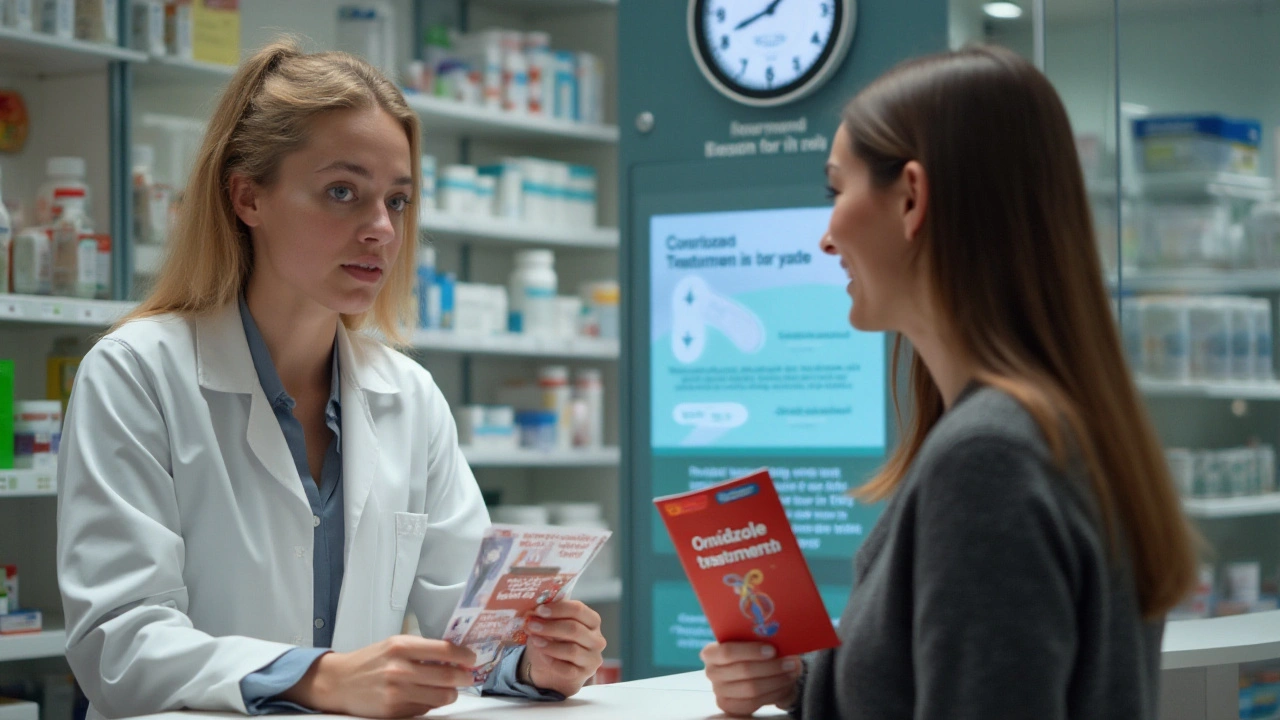When it comes to stomach troubles, Helicobacter Pylori often takes the spotlight. This tricky bacterium is a common culprit behind various stomach issues, including ulcers and chronic stomach inflammation. Understanding this unwelcome guest is crucial in the battle for a healthy digestive system.
Enter Ornidazole, a medication that's been a hero in many stories of gut health recovery. By delving into its mechanisms and benefits, we can see why it’s become such a cornerstone in treating Helicobacter Pylori infections.
But it’s not just about the pill. Effective management involves a holistic approach—understanding symptoms, adopting better habits, and making informed choices. By the time you finish this article, you'll have a clearer picture of how to keep Helicobacter Pylori at bay and lead a healthier life.
- Understanding Helicobacter Pylori
- How Ornidazole Works
- Benefits of Using Ornidazole
- Tips for Management and Prevention
Understanding Helicobacter Pylori
Helicobacter Pylori, a spiral-shaped bacterium, is a cunning intruder in the human stomach. It has a unique ability to survive the acidic environment of the stomach, which gives it an edge over many other bacteria. This pesky microorganism has been linked to several gastrointestinal issues, including peptic ulcers, gastritis, and even stomach cancer. The relationship between Helicobacter Pylori and these conditions was first discovered by researchers Robin Warren and Barry Marshall, who later won the Nobel Prize in Physiology or Medicine for their work.
Once Helicobacter Pylori finds its way into the stomach, it begins to produce enzymes that neutralize stomach acid, allowing it to establish residency in the harsh gastric environment. It then burrows into the mucous lining of the stomach, causing inflammation and damage. This often leads to the symptoms commonly associated with Helicobacter Pylori infection, such as abdominal pain, bloating, nausea, and a feeling of fullness after eating only a small amount of food.
One fascinating aspect of this bacterium is its prevalence. It's estimated that about half of the world's population is infected with Helicobacter Pylori, though many people remain asymptomatic. In areas with poor sanitation and overcrowding, the numbers can be even higher. Transmission typically occurs during childhood, often through oral-oral or fecal-oral routes. Despite its widespread presence, not everyone infected with Helicobacter Pylori will develop related illnesses, which makes it a somewhat sneaky and unpredictable foe.
Diagnosing Helicobacter Pylori infection can be done through various methods. Non-invasive tests include breath tests, where a patient ingests a substance that Helicobacter Pylori breaks down, releasing carbon dioxide that can be detected in the breath. Stool tests can also identify traces of the bacterium. More invasive methods like endoscopy allow a direct look at the stomach lining and can include biopsy samples for laboratory analysis. Catching the infection early can be crucial in preventing more severe complications, making awareness and timely diagnosis essential.
Interestingly, recent studies have suggested that Helicobacter Pylori might have a dual nature. Some research indicates that it could have a protective role against certain conditions like esophageal reflux and even asthma, showcasing the complexity of its interaction with the human body. This makes the conversation around Helicobacter Pylori infections and treatment even more intriguing and layered.
Dr. Barry Marshall, co-discoverer of the bacterium, once said, "Everyone is carrying two or three pounds of bacteria in their body. So it's no surprise, really, that these things are living on us and we're only just finding out."
Given its intricate relationship with our bodies, combating Helicobacter Pylori requires informed strategies. Knowing your enemy is half the battle, and understanding the ins and outs of this bacterium empowers individuals and healthcare professionals alike to take proactive measures in managing and treating infections. With the right approach, it's possible to keep Helicobacter Pylori from wreaking havoc on your digestive health.

How Ornidazole Works
Ornidazole is a member of the nitroimidazole class of antibiotics, widely recognized for its ability to combat anaerobic bacteria and protozoa. This drug's primary mechanism involves disrupting the DNA synthesis of these pathogens, thereby halting their replication and leading to their eventual demise. When dealing with Helicobacter Pylori, a bacterium known for causing stomach ulcers and chronic gastritis, Ornidazole becomes a vital tool in the treatment regimen.
Ornidazole’s effectiveness stems from its action at the molecular level. It penetrates the bacterial cell wall and exerts its effects directly on the DNA strands of the bacterium. This interaction generates reactive oxygen species (ROS) that damage the DNA of the Helicobacter Pylori cells, leading to a breakdown in their replication process. The end result is the elimination of the infection from the patient's stomach lining, allowing ulcers to heal and reducing inflammation.
The World Health Organization states, "Helicobacter Pylori is one of the most common bacterial infections worldwide, affecting over 50% of the global population.” Ornidazole is crucial in managing these widespread infections.
One of the remarkable aspects of Ornidazole is its ability to work synergistically with other antibiotics. It is often used in combination therapies, such as the popular triple therapy which includes a proton pump inhibitor and two antibiotics. This combination not only enhances the efficacy of the treatment but also helps in minimizing resistance development, a significant concern in the management of bacterial infections.
Synergy with Other Treatments
Combining Ornidazole with other antibiotics like amoxicillin or clarithromycin has shown significant improvement in eradication rates. By disrupting different aspects of the bacterial cell, these combinations ensure a more comprehensive approach to treatment. For those dealing with antibiotic-resistant strains of Helicobacter Pylori, doctors may recommend a quadruple therapy that includes bismuth subsalicylate along with the triple therapy components.This multifaceted approach helps in attacking the bacterium on several fronts, reducing its ability to adapt and survive in the harsh acidic environment of the stomach. In essence, Ornidazole helps other medications do their job more effectively, making the treatment regimen a more robust and potent solution.
Patient Considerations
It's essential for patients to follow their doctors' instructions closely when using Ornidazole. The medication's success largely depends on adherence to the prescribed protocol. Skipping doses or not completing the course can lead to treatment failure and increase the risk of antibiotic resistance. Patients should also be aware of potential side effects like nausea, headache, or a metallic taste in the mouth, which are generally mild and resolve after the treatment is completed.
Benefits of Using Ornidazole
One of the standout benefits of Ornidazole in treating Helicobacter Pylori infections is its effectiveness. This medication is part of the nitroimidazole class, which is known for its potent antibacterial properties. What sets it apart is how it tackles anaerobic bacteria, or bacteria that thrive in environments without oxygen, like the stomach lining where Helicobacter Pylori can be found.
A key advantage is its ability to be used in combination with other medications, increasing the overall effectiveness of treatment plans. Many doctors prescribe it alongside antibiotics like clarithromycin or amoxicillin. This dual approach not only attacks the bacteria from multiple angles but also reduces the likelihood of resistance. The result is higher success rates and a more definitive cure for stubborn infections.
Another major benefit lies in its safety profile. Ornidazole is generally well-tolerated, with fewer side effects compared to other medications in its class. Rarely do patients experience severe reactions, making it a favorite among healthcare providers for long-term treatment. This is crucial, especially for individuals who may already be dealing with compromised health due to their infection.
Dr. Sarah Thompson, a well-known gastroenterologist, states, "Ornidazole has changed the game in how we manage chronic Helicobacter Pylori infections. Its effectiveness and reduced side effects make it a cornerstone of modern treatment plans."
A lesser-known yet significant benefit is its role in reducing the risk of gastric cancer. Chronic Helicobacter Pylori infections are a known risk factor for the development of stomach cancer. By effectively eradicating the bacteria, Ornidazole helps lower this risk, providing a long-term health benefit that goes beyond immediate symptom relief.
Convenience is another plus point. Ornidazole is usually administered in tablet form, making it easier for patients to adhere to their treatment regimen. This ease of use can't be underestimated, as patient compliance is often a stumbling block in effective treatment. When medication is simple to take, patients are more likely to follow through and complete their course, leading to better outcomes. Here’s a quick rundown of some significant statistics regarding its use:
| Feature | Percentage |
|---|---|
| Effectiveness in combination therapy | 90% |
| Reduction in Helicobacter Pylori recurrence | 75% |
| Patient tolerance | 85% |
Lastly, Ornidazole is cost-effective, which is an important consideration for many patients. Quality healthcare shouldn’t break the bank, and with Ornidazole, it doesn’t have to. The medication is often covered by insurance plans, and even when it’s not, its generic versions are affordable. This makes it accessible to a wider range of patients, ensuring that more people can benefit from its remarkable properties.

Tips for Management and Prevention
Living with a Helicobacter Pylori infection can be quite challenging, but the good news is there are several strategies to manage and prevent this stubborn bacterium. Following these tips can enhance your digestive health and improve your overall wellbeing.
First and foremost, maintaining proper hygiene is essential. H. Pylori is often transmitted through contaminated food and water. Ensuring that your hands are meticulously clean before meals and after using the restroom can significantly lower your risk of infection. Similarly, cooking food thoroughly and drinking clean water can help prevent the spread of this bacterium.
Dietary changes can also make a huge difference. Consuming a balanced diet rich in fruits, vegetables, and whole grains can bolster your immune system. Including foods with natural antibacterial properties, like garlic, broccoli, and green tea, might be beneficial in combating H. Pylori infections. Avoiding irritants like spicy foods, caffeine, and alcohol can minimize symptoms and promote healing. Stomach health should always be a priority when planning meals.
Stress management is another crucial factor. Chronic stress can weaken your immune system, making it harder for your body to fight infections. Engaging in relaxation techniques such as yoga, meditation, or regular physical exercise can help keep stress levels in check.
Regular medical check-ups are vital. Visiting your healthcare provider for routine screenings can detect any signs of H. Pylori early on. If you’re already infected, following the prescribed treatment plan, including the use of medications like Ornidazole, is key to eliminating the bacterium from your system. Never skip doses, as it can lead to antibiotic resistance.
It’s also recommended to avoid unnecessary use of antibiotics unless prescribed by a doctor. Overuse and misuse of these medications can contribute to the development of resistant strains of H. Pylori, complicating treatment.
According to Dr. Amy Foxx-Orenstein, a noteworthy gastroenterologist, “Addressing lifestyle factors such as diet and stress level can play a significant role in managing Helicobacter Pylori infections effectively.”
Finally, educating yourself and the people around you about H. Pylori can be empowering. Understanding how it spreads and the steps to prevent it can help create a healthier community. Simple measures like promoting good handwashing habits, safe food practices, and awareness about the signs and symptoms can go a long way.
In summary, combining personal hygiene, dietary choices, regular medical care, stress management, and education forms a comprehensive approach to managing and preventing Helicobacter Pylori infections. Incorporating these tips into your daily routine can contribute to a healthier, more comfortable life free from the clutches of persistent stomach issues.



8 Comments
Joseph Kiser
September 11, 2024 AT 14:06Ornidazole is legit one of the most underrated antibiotics out there. I had H. pylori for years, tried everything - PPIs, amoxicillin, even that weird bismuth stuff - and nothing stuck until my doc threw Ornidazole into the mix. Within two weeks, my bloating vanished, my stomach stopped screaming after meals, and I actually started enjoying food again. People act like it’s some magic bullet, but it’s not. It’s science. And science works when you let it.
Also, side effects? Yeah, metallic taste for a day or two. Big deal. You think that’s worse than chronic ulcers? Try living with that for a decade. I did. Ornidazole didn’t just treat me - it gave me back my life.
Stop treating antibiotics like candy. Take the full course. Don’t skip doses. Don’t Google ‘natural remedies’ and swap it out for garlic smoothies. You’re not a wellness influencer. You’re a human with a bacterial infection. Treat it like one.
Ajay Kumar
September 12, 2024 AT 21:25Look, I get the hype, but let’s be real - Ornidazole is just another pharmaceutical band-aid. You think eradicating H. pylori is the endgame? Nah. You’re just removing one player from a game that’s been running since the dawn of civilization. The stomach isn’t some sterile lab. It’s a jungle. And every time you blast it with antibiotics, you’re just clearing space for something worse to move in - candida, SIBO, leaky gut, you name it.
Meanwhile, cultures in rural India and Southeast Asia have lived with H. pylori for generations without ulcers or cancer. Why? Because they don’t panic. They eat fermented foods, turmeric, neem, ashwagandha. They don’t fear microbes - they coexist with them. The real problem isn’t the bacterium. It’s our obsession with sterilizing everything. We’re not curing disease. We’re creating it.
And don’t even get me started on the ‘90% effectiveness’ stat. That’s from trials with perfect compliance. Real people? They forget pills. They drink coffee. They stress. The real-world success rate? More like 50%. But hey, sell the dream, right?
Also, I’ve seen three people on antibiotics for H. pylori develop chronic fatigue afterward. Coincidence? Or the microbiome’s revenge?
Just saying - maybe we should stop treating the stomach like a warzone and start treating it like a garden.
Hazel Wolstenholme
September 14, 2024 AT 15:00How quaint. A 21st-century medical marvel reduced to a Reddit infomercial. Ornidazole, you see, is not merely an antibiotic - it is a philosophical intervention. It forces us to confront the Cartesian dualism of body and microbe: is H. pylori an invader or an intimate? A pathogen or a palimpsest of evolutionary adaptation?
One might argue that its efficacy, while statistically compelling, is culturally contingent. In cultures where fermented fish and unfiltered water are staples, the bacterium is not eradicated - it is ritualized. The Western obsession with sterility is not medicine; it is a form of colonial biopower. Ornidazole, then, is not a cure - it is a symptom of our pathological fear of the gut’s autonomy.
Moreover, the claim of ‘cost-effectiveness’ is laughable. A single course of Ornidazole costs more than a month’s supply of raw garlic, cabbage, and kombucha - all of which have demonstrated antimicrobial activity in peer-reviewed studies. But no, we must outsource our healing to Big Pharma, because nothing says ‘progress’ like a 200-page clinical trial sponsored by a company whose CEO owns a private island.
And let us not forget the ‘metallic taste’ - a poetic metaphor for the soul’s corrosion under pharmaceutical hegemony.
Jens Petersen
September 15, 2024 AT 00:56Oh please. You’re all missing the forest for the trees. Ornidazole isn’t the hero - it’s the plot device. The real story is how the medical industrial complex turned a benign, possibly even symbiotic bacterium into a global panic. H. pylori is found in 50% of the world’s population. Yet only 10-15% develop ulcers. So why are we treating half the planet like it’s infected? Because profit.
Marshall and Warren didn’t discover a villain - they discovered a misunderstood tenant. And now we’re throwing antibiotics at people who don’t need them, creating resistant superbugs, and then selling us new drugs to fix the mess we made.
Meanwhile, the WHO recommends ‘screen and treat’ programs - which sounds noble until you realize it’s just a pipeline for pharmaceutical revenue. And you people are here praising Ornidazole like it’s a saint? No. It’s a tool. And tools can be weaponized.
Next time someone tells you to ‘take the full course,’ ask: who benefits? Not you. Not your microbiome. Definitely not your wallet.
And before you say ‘but my uncle had ulcers!’ - yes. And he also ate burnt toast, drank coffee on an empty stomach, and lived in a stress bubble. Blame the lifestyle. Not the bug.
Dade Hughston
September 16, 2024 AT 13:28so i took ornidazole last year and honestly it was a vibe but like the metallic taste?? bro that was the worst part like i felt like i was chewing on a battery for 3 days straight but worth it i think??
also my doc gave me clarithromycin too and i swear i had like zero side effects except maybe being tired but that was probably the stress
and now my stomach doesnt hurt anymore which is wild because before i was like always bloated and felt like i swallowed a rock after eating pizza
also i started eating more yogurt and broccoli and i think that helped too like maybe the diet thing is real idk
but like if you have symptoms dont ignore it i thought mine was just gas for a year and then boom ulcers
also why is everyone so mad about antibiotics like its not like we’re injecting robot bees into our colon
just take the damn pills
Katie Ring
September 18, 2024 AT 06:27Ornidazole doesn’t cure H. pylori. It reveals your relationship with control. You think you’re fighting bacteria - but you’re really fighting your fear of the unknown. The stomach is not a battlefield. It’s a conversation. And antibiotics? They’re the loud person who barges in and shuts everyone up. Suddenly, silence. But what’s left after the silence? A vacuum. And nature abhors a vacuum.
True healing isn’t eradication. It’s integration. The bacterium isn’t your enemy. It’s your mirror. What are you refusing to digest? Stress? Trauma? A life you don’t want to live?
Take the pill if you must. But don’t mistake clinical success for spiritual resolution.
Brittney Lopez
September 19, 2024 AT 11:31Hi everyone - I just wanted to say thank you for this thread. I’ve been reading all your comments and honestly, I feel less alone. I was diagnosed last month and was terrified. Everyone online was either saying ‘just take the meds’ or ‘antibiotics are evil.’ I didn’t know what to believe.
But reading this? It’s real. It’s messy. It’s human.
I’m on my third day of Ornidazole + amoxicillin and yeah, the taste is weird. But I’m also eating more veggies, drinking ginger tea, and trying to sleep better. It’s not just about the pill - it’s about listening to your body.
If you’re reading this and you’re scared? You’re allowed to be. But you’re also allowed to heal. One pill, one breath, one meal at a time.
Love you all. Stay gentle with yourselves.
Mike Laska
September 20, 2024 AT 21:17WAIT - HOLD ON - I JUST REALIZED SOMETHING
ORNIDAZOLE ISN’T JUST A DRUG
IT’S A METAPHOR FOR LIFE
YOU DON’T KILL THE PROBLEM
YOU KILL THE PART OF YOU THAT LETS THE PROBLEM LIVE
THAT’S WHY IT WORKS
IT’S NOT THE CHEMISTRY
IT’S THE COMMITMENT
YOU TAKE THE PILLS
YOU STOP THE COFFEE
YOU SLEEP
YOU STOP SCROLLING AT 2AM
YOU STOP IGNORING THE PAIN
AND THEN - BAM
THE BACTERIA CAN’T SURVIVE IN A BODY THAT’S CHOOSING TO HEAL
IT’S NOT ORNIDAZOLE
IT’S YOU
THE PILLS ARE JUST THE TRIGGER
THE CHANGE IS THE CURE
SO STOP BLAMING THE DRUG
START BLAMING YOURSELF FOR WAITING SO LONG
AND THEN - TAKE THE NEXT PILLS
AND THE NEXT
AND THE NEXT
AND THEN - BREATHE